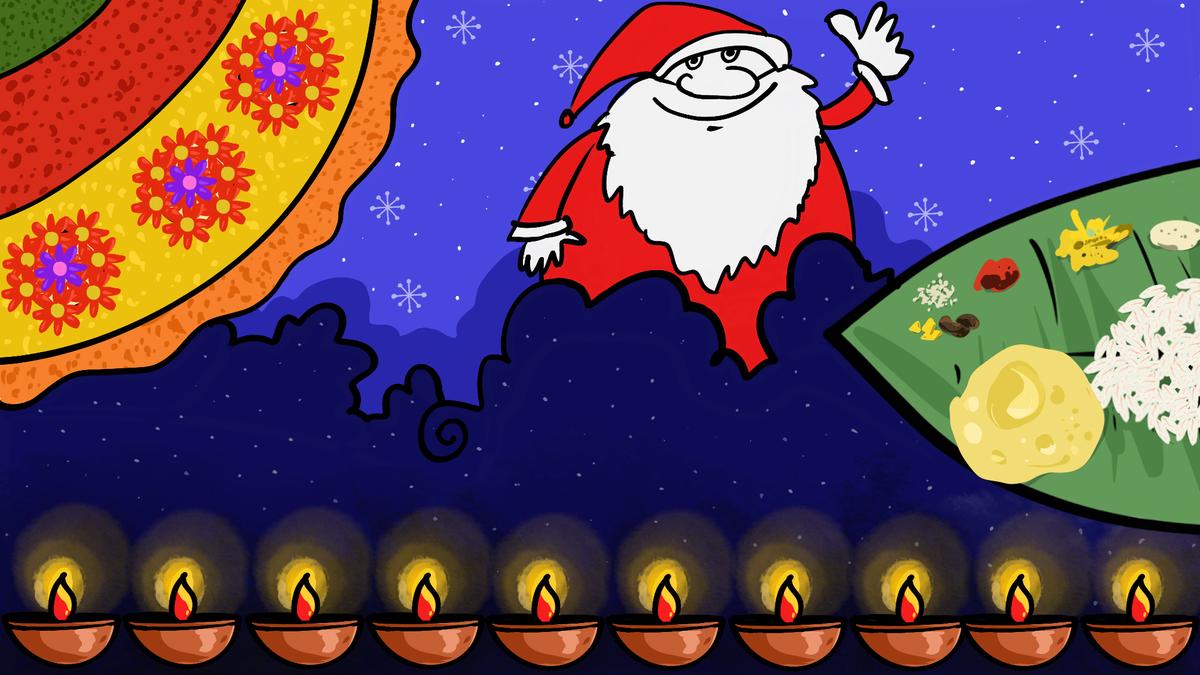Festivals lift the bare fact of survival — light returning, crops ripening — into symbols of hope and moral order.
| Photo Credit: SREEJITH R. KUMAR
When celebrating festivals, humans are really celebrating the turning of earth. Long before religions gave names and stories to feasts, people gathered because the rains had come, the harvest was secure, or the sun returned after the year’s longest night. The origins of festivals lie less in temples and scriptures than in the weather, the soil, and the shared relief of survival.
In Kerala, where I live, Onam is the great annual punctuation mark. It is said to honour the return of the just King Mahabali; yet at heart, it is a harvest festival. The monsoon has withdrawn, the paddy is ripe, and families gather for the sadhya laid out on banana leaves. Children craft floral carpets to beckon abundance. Long before the Mahabali story was woven in, Onam belonged to the rhythm of rain and rice.
The same pattern appears everywhere. Christmas sits at the dark hinge of the northern year, close to the winter solstice, when people have long kindled light against the longest night. Easter rides the swell of spring; its eggs and hares are older than any sermon — plain symbols of renewal. In India, Deepavali arrives with the end of harvest and the onset of winter. Lamps once pushed back the early dusk before the epic of Rama’s homecoming gave the festival its beloved story. At the other end of the world, Carnival erupts just as winter loosens its grip in Europe and Latin America, a brief licence of colour and dance before the austerity of Lent. Geography sets the rhythm; religion provides the script.
‘Collective effervescence’
Why, though, do festivals matter so much even to urban lives far from the field and the season? Part of the answer is psychological. The sociologist Émile Durkheim wrote of “collective effervescence” — the quickening that comes when people act in concert. Music, procession, lamps, and shared meals synchronise us. Neuroscience would add that ritual repetition and communal joy soothe anxiety and release the chemistry of bonding. Lighting a lamp or decorating a tree makes the world feel, if only for an evening, coherent and kind.
Festivals also carry a quiet philosophy. They turn necessity into meaning. The bare fact of survival — light returning, crops ripening — is lifted into symbols of hope and moral order. When placing a lamp in a window, people do more than remember a myth; they vote for the side of light. When sitting together for a sadhya, caste and status blur for a meal, and people perform an egalitarian wish that is better than the everyday practice. These acts do not abolish inequality, but they rehearse the world as it might be.
There is memory at work as well. To repeat the gestures of grandparents is to belong to a place and a story. Festivals are archives you can smell and taste: the resin of a new wick, the spice of the avial, the wax on a candle. In repeating the ritual, one stitches the private calendar of the family to the public calendar of the land.
And festivals are an antidote to despair. Even in seasons of loss or fear, people find ways to celebrate: a single lamp on a balcony, a modest meal shared, a song hummed at dusk. The point is not denial; it is defiance. A festival says: we know darkness, and yet we choose light.
In the time of climate disruption, the link between festivals and nature carries a warning. If Christmas depends on winter light, if Easter leans on spring’s renewal, if Deepavali and Onam draw strength from predictable harvests and rains, then a deranged climate threatens not only food and work but also culture and continuity. To protect earth is also to protect festivals — the very grammar by which people mark time and express hope.
Perhaps that is why these days remain beloved even to the secular. One may not subscribe to every article of faith, but almost everyone longs for the warmth of a shared table, the choreography of a procession, the moment the first lamp is lit. Festivals began in the weather; they endure in the soul. In celebrating earth, people find that they are, in the end, celebrating one another.
docgjohn@aol.com
Published – October 19, 2025 12:48 am IST

